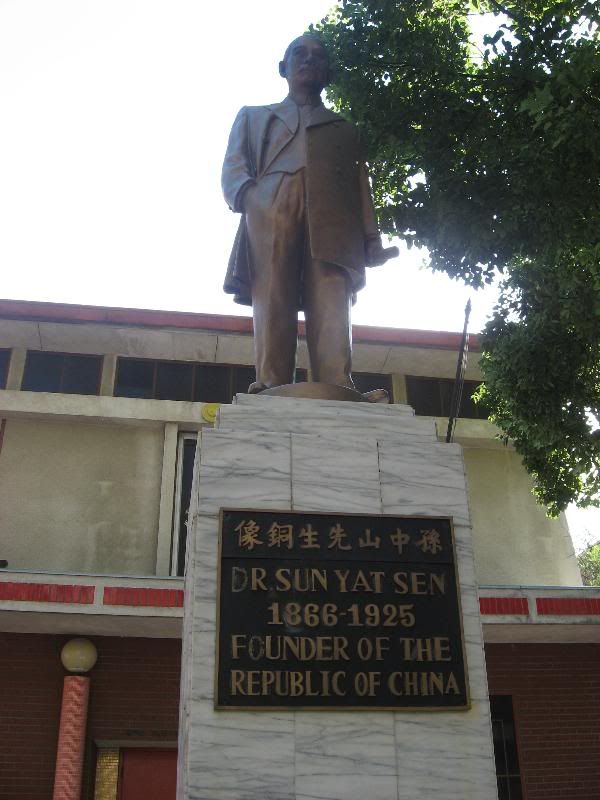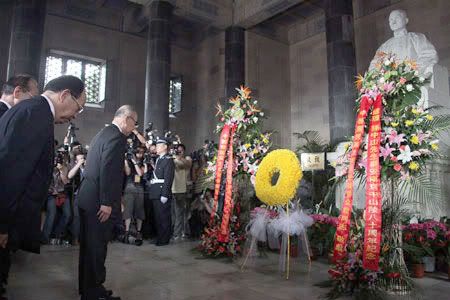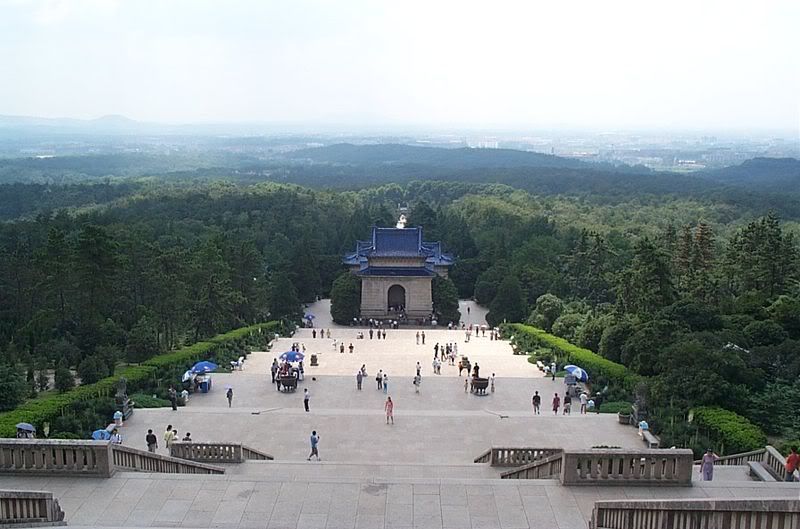Going around the country
In Sacramento a few years ago, wandering around between appointments, I come across the brooding figure of Sun Yat Sen.

Steady, unpretentious, dignified, reserved - he looks so unlike other leaders of his era. The sculptor knew his business, and I couldn't help thinking of those lines from Shelley:
...its sculptor well those passions readHow apt, I remember thinking, The Republic of China is really just a fiction now, and already his deeds are washed away. China has always said Taiwan is its rightful possession, and now most of Taiwan's allies, however friendly, agree. I put the sad story out of my mind, and went on.
Which yet survive, stamped on these lifeless things,
The hand that mocked them and the heart that fed;
And on the pedestal these words appear:
My name is Ozymandius, King of Kings,
Look on my works, ye Mighty, and despair!
Nothing beside remains. Round the decay
Of that colossal wreck, boundless and bare
The lone and level sands stretch far away.
A few years later, I perused a tourist map as I strolled through the Holiday Inn in Penang. There was that name again. At 120 Armenian Street, an unassuming shophouse served as headquarters for the Tung Meng Hui, also known as the Chinese Revolutionary Alliance. From there Sun Yat Sen raised money from the overseas Chinese and helped fund The Second Guangzhou Uprising against the Manchus - another in a series of failed but important mutinies that foreshadowed the Wuchang Uprising, which, in turn, led to the 1911 Xinhai Revolution that toppled the Qing Dynasty.
Unlike most successful revolutionaries, Dr. Sun didn't spent much time around the revolution (he had grown up in Hawaii and Hong Kong, and read of the Wuchang Uprising in a Colorado newspaper). He fought by other means, traveling through the Chinatowns of the world for years, raising money for the anti-Imperial forces and building political support for the Teng Meng Hui (later known as the Kuomintang, or Nationalist Party).
The Qing, in their turn, did everything they could to neutralize him. In 1896 Qing operatives kidnapped him in London and tried to smuggle him to China for execution. The plan miscarried only because of the timely intervention of Sir James Cantlie, one of his teachers. (After the 1911 revolution Cantlie wrote the classic Sun Yat Sen and the Awakening of China. )
As I scanned a tourist map in Vancouver last year, I couldn't help but notice the Dr. Sun Yat Sen Chinese Garden, which, upon inspection, proved to be the highlight of our trip. Constructed in the classical Chinese style, the garden harmoniously combines rock, water, plants, and architecture. It is a beautifully-conceived island of classical Chinese sensibility, utterly disconnected from its point of origin.

A shame Dr. Sun never got to see it. He had been to Vancouver before it was built, of course. On three separate journeys he passed through, staying at the Chinese Freemasons' Lodge at Pender and Carrall.
The garden and its surrounding facility well represent the deep synthesis Dr. Sun sought to achieve. At the turn of the century there was no question among Chinese intellectuals that China and its institutions had to change. The country's extraordinarily complex and deeply-rooted socioeconomic system was unfortunately utterly unsuited to modern technologies or the destructive forces of colonial capitalism. Those who aspired to govern after the 1911 revolution faced the challenge of destroying enough to allow the transition to a modern society, without destroying so much that the people and nation forgot their identities altogether.
Dr. Sun was under no illusions about this - not only would institutions have to be re-invented. So, too, would the people. They must become more modern in their attitudes - they must discard ancient customs that once had served them well, but now made them the servants of others. This insight uniquely connected him to his ambivalent allies, the Communists.
In the summer of 1923 Dr. Sun traveled to Canton and met with them. "There must be a great revolutionary union," said the ever-persuasive Mao - "one cannot fight alone." And, by now, both Sun and Mao knew who they were fighting. In the words of biographer Ross Terrill:
[Mao] had long thought that the struggle for a new China was an anti-imperialist struggle. The Nationalists in 1923 were anti-imperialist. Indeed, the issue was the logical - maybe the sole - common denominator among the emerging triangle of Sun-Moscow-CCP. Mao was in favor of the broadest possible array of Chinese strata against the foreign mauling of China.Dr. Sun surely agreed, but he ran out of time. In 1925, as he tried once again to organize peace talks to unify the country under one national government, he died of liver cancer at the Rockefeller Hospital in Beijing.
He is, of course, revered in Taiwan. He is held in equally high regard by the People's Republic of China. In June of this year, when Kuomintang Chairman Wu Poh-hsiung visited China, he visited Dr. Sun's masoleum in Nanjing, on the 80th anniversary of the great man's formal interment.

They say history is written by the victors, but Sun Yat Sen's triumph over the Qing was lost in the magnitude of the disasters of the century that followed. His strengths - educated intelligence, sophistication, and diplomatic ability - were not enough to carry the day in post-1911 China. It was an environment that perhaps inspired Mao's observation about political power and gun barrels. He had won the initial battle and stated the remaining problems, but was unable to complete the victory. If anything, his alliance with the Communists had brought yet another foreign power - Russia - into the equation.
So far as I can tell he did not attach a spiritual dimension to the struggle (although he is one of three saints in the Vietnamese Cao Dai religion)...but what can we make of the curse under which he lived? His greatest triumphs came when he was far from his homeland - his greatest disappointments when he was within its borders. He was fated to spend most of his life en route, moving from one village of exiles to another - to be regarded as the father of a country in which, while living, he never could take his rightful place.
I seem to meet him everywhere I go, and often think of his beautiful garden in Vancouver.
Only to wanderers can come
Ever new the shock of beauty,
Of white cloud and red cloud dawning from the sea,
Of spring in the wild-plum and river-willow....
I watch a yellow oriole dart in the warm air,
And a green water- plant reflected by the sun.
Suddenly an old song fills
My heart with home, my eyes with tears.
- Du Shenyan
Sun Yat-sen Mausoleum, Nanjing



2 Comments:
Nicely done, Sir. This is an area of history I know embarrassingly little about, and these are succinct and compelling essays about why it resonates.
Thank you...two more walks coming, no prizes for guessing the next one.
Post a Comment
<< Home